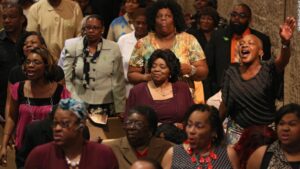If you did random sampling on any church on a given day in any suburb in Uganda, it’s obvious you are likely to find over 70% of the congregation comprised of Females and the 30% being Males
Uganda is one of those countries that has a strong religious tradition.

According to a 2018 survey, 84% of Ugandans identify themselves as Christians, and the remaining 16% identify with other religions, such as Islam, Hinduism, or traditional African religions.
Women are more likely to be religious than men in this religious landscape. For instance, a 2020 study found out that 70% of Ugandan women identify themselves as religious.
This statistic does not apply in Uganda alone, but worldwide with an estimated 83.4% of women identifying with a faith group, compared with 79.9% of men, according to Pew Research Centre.
Taking a look at history and culture, throughout history and across cultures, one intriguing trend has consistently emerged where women tend to be more religious than men.
While avoiding generalizations and acknowledging individual differences is essential, various factors may help to shed light on this phenomenon.
According to Reverend Clovis Kyalimpa of St John’s Cathedral Church of Uganda (Rugaatwa) in Kabarole district, there are several factors that may contribute to this gender gap in religiosity.
“Socialization plays a significant role in shaping religious beliefs and practices. From an early age, children are exposed to societal norms that define gender roles. Traditionally, women have been assigned roles that emphasize nurturing, empathy, and community involvement, attributes that often align with religious values,” Rev. Kyalimpa said.
“In contrast, men are encouraged to adopt characteristics associated with strength, assertiveness, and independence. These differing societal expectations may lead to women seeking solace and support in religious communities and practices,” Kyalimpa narrated.
Adding, “Another factor contributing to the disparity may be the sense of empowerment and identity that women derive from religious involvement. In certain cultures, women’s rights and opportunities are limited outside of religious spaces. By participating actively in their faith communities, women can find an outlet for self-expression and a sense of belonging that empowers them within the confines of their societal roles.”

More so, the way men and women cope with life’s challenges accounts for the varying levels of religious devotion. women tend to be more relational in their coping strategies, seeking support and understanding from others. Religion, with its emphasis on communal support and the belief in a higher power’s kindness, offers an ideal framework for women to navigate difficult circumstances.
Men may be more inclined to rely on self-reliance and practical problem-solving, leading them to explore alternative avenues for coping outside of religious communities.
However, Pastor Richard Magumba of Reigning in Life Ministries-Kansanga said that biological and neurological differences between men and women shape religious tendencies.
“Some studies have proposed that women’s brains are wired to be more empathetic and emotionally attuned, making them more receptive to spiritual experiences that invoke emotions and a sense of interconnectedness unlike their male counterparts,” Magumba noted.
The greater religious participation among women than men can be attributed to a myriad of intertwined factors, ranging from socialization and cultural norms.
Nevertheless, it is crucial to recognize that individuals are diverse, and personal beliefs and behaviors defy simplistic generalizations. Embracing this allows us to appreciate the rich display of religion across gender lines, fostering a more inclusive and empathetic understanding of human spirituality.















